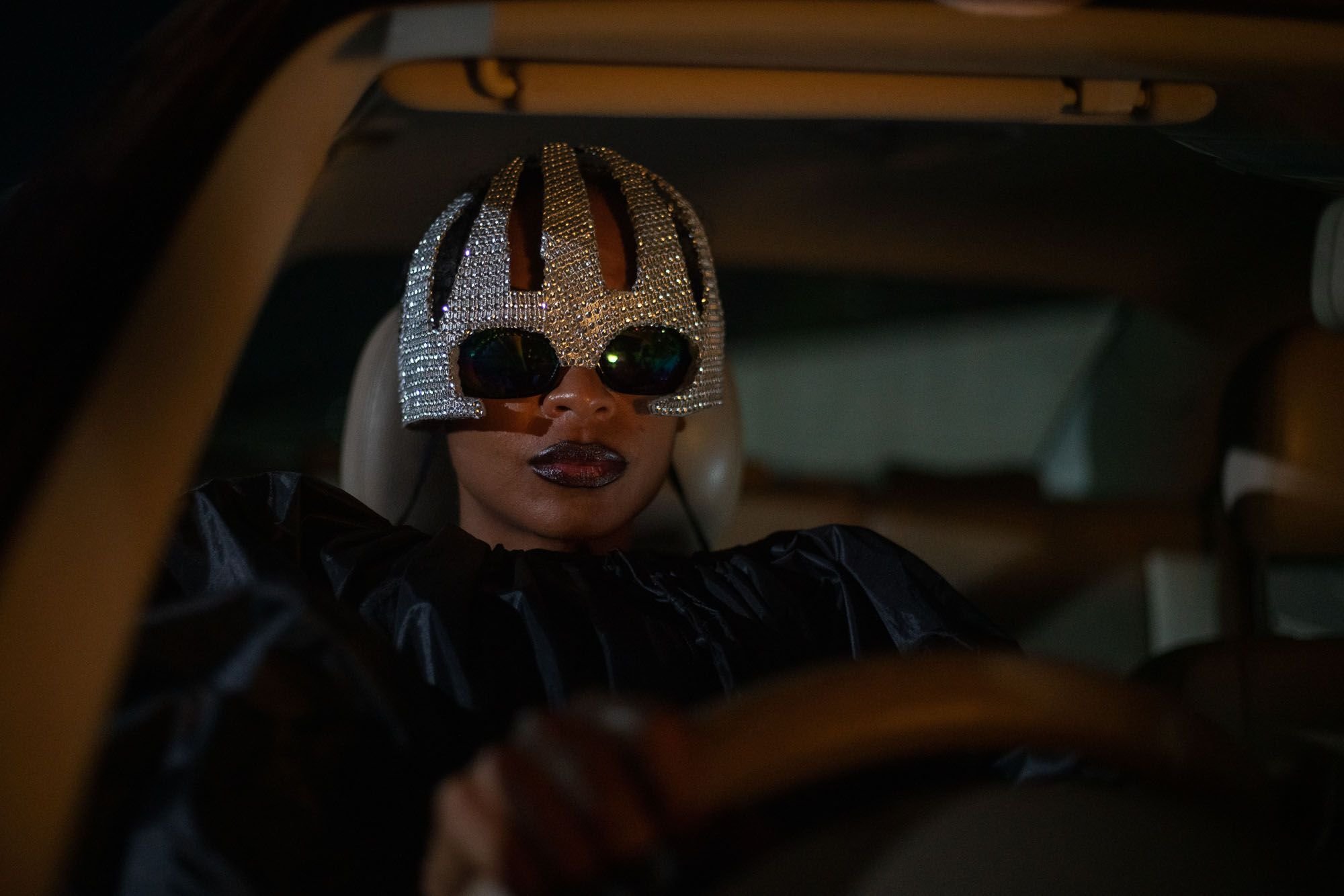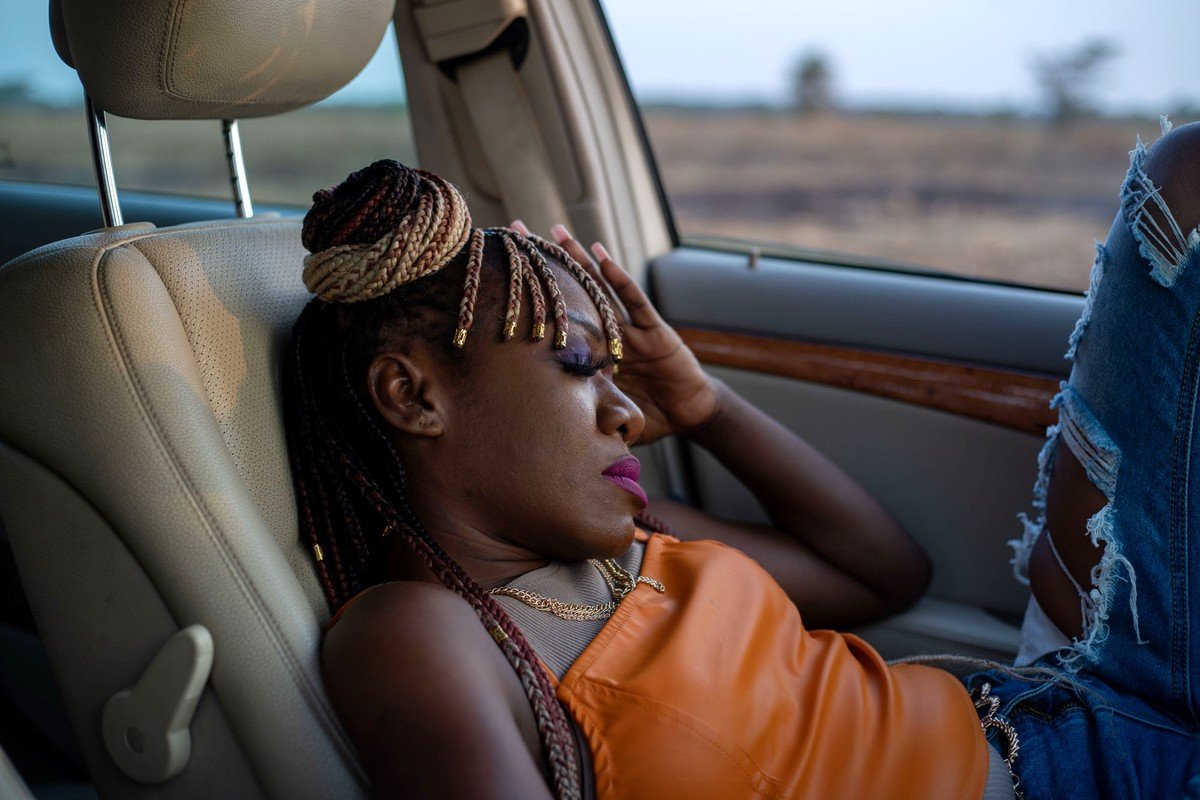With On Becoming a Guinea Fowl, Rungano Nyoni Pulls Truth from the Depths of Memory
Director/writer Rungano Nyoni’s On Becoming a Guinea Fowl—her second feature film after 2017’s I Am Not a Witch—stands with Bunny as the best film of 2025 so far. It’s a haunting, unsettling trip through the death of an awful man and his family’s mixture of genuine grief and a poisonous desire to sweep his abuses under the rug for the sake of profit and propriety.
Shula (Susan Chardy) is driving home from a costume party. She’s built a good life. She has friends, a job she likes, and independence from her controlling extended family. But, as she drives through a deep night in rural Zambia, Shula passes a still body on the road. When she stops to check, the body turns out to be the corpse of her Uncle Fred (Roy Chisha). She sees the body. She sees herself as a child (Blessings Bhamjee). So, Shula makes a phone call. While she loathed Fred, she won’t leave him to rot, for her family, more than for herself.
Shula’s family is of the Bemba people, and Bemba funerals are for the living. In this case, that means prioritizing the greater family’s need to secure Fred’s inheritance from his substantially younger widow (Norah Mwansa) and grieve for him over reckoning with his decades-long history of incestuous sexual abuse. As the family slowly gathers at Shula’s mother’s home, traditions and rites unfold. Shula, her hard-partying cousin Nansa (Elizabeth Chisela), meanwhile, search and then fight for answers about why the family aims to bury the truth about Fred with him.
Nyoni, DP David Gallego (Embrace of the Serpent), and editor Nathan Nugent (Frank) build a film where dreams and the unspoken mingle and bleed into reality. When Shula discovers Frank’s corpse, she finds herself back in her car, watching her younger self, dressed in the same elaborate party costume, watch Frank. When Shula and Nsansa are sent to pick up their cousin Bupe (Esther Singini) from school, they have to trek through her dorm as it’s being mopped, leading Shula to dream of a false awakening in her mother’s home, deserted and flooded.
Throughout the film, Shula finds herself thinking back to a half-remembered kids’ show about guinea fowls, the context of which leads directly to the picture’s indelible closing sequence. Taken on their own, On Becoming a Guinea Fowl’s dream sequences are strikingly composed and executed, particularly Shula’s dream of her mother’s home and the lead up to her true awakening. In the film’s narrative context, Nyoni, Gallego, and Nugent use the surrealism of their dream sequences to heighten the tensions and absurdities of the funeral.
While funerary traditions and rites are longstanding and well-known, they’re still disruptive, even when the deceased isn’t an acknowledged serial predator. Shula’s mother clears her living room of furniture so that the women of the family, from its matriarchal Aunties to (initially) the much-reviled widow, may sleep beside each other for the duration of the funeral, a multi-day event with the family assembling from across Zambia. Attendance is mandatory. Life and work will wait. Medical emergencies can be put on the back burner once the worst danger has passed. Shula’s processing Fred’s demise and the scale of his abuses, and she’s not alone in doing so, but there are still dozens of people to cook for. It’s a crucible as much as a funeral.
Amidst the tension and surrealism, Nyoni and the acting ensemble craft a moving and unsettling film. The family failed Shula, Nsansa, and Bupe. Their Aunties admit as much. Despite that, they insist on mourning Fred as the best version of himself, “ever jovial and joyous,” even though everyone who held power in the family, who could conceivably have stopped him, knew he was a predator. Despite crying for their children, the Aunties seize on the widow’s anxiousness and raw, angry grief to make her into a scapegoat. Fred is dead. His abuse cannot be undone, and neither can his family’s passive enabling of it. But, On Becoming a Guinea Fowl argues, the status quo does not have to be eternal. The pieces can be put together. As the kids’ show that Shula remembers says, the guinea fowl can give out a warning call.
On Becoming a Guinea Fowl is often bleak and always thoughtful. It’s also very funny when it needs to be. Chardy and Chisela build Shula and Nsansa a fun, spiky chemistry. The cousins know each other well enough not to get along. Shula’s idea of fun is a stylish costume party. Nsansa’s idea of fun is what sounds like a rager, one she snags a bottle from on her way to watch over Fred’s freshly discovered corpse with Shula. The Aunties, amidst their trying to hold to tradition no matter the harm it has done, snipe, meddle, and bicker. The funeral is a massive undertaking, to the point that even amidst the heaviest moments, absurdity has a way of winning out. One of On Becoming a Guinea Fowl’s most striking moments is simultaneously ridiculous and utterly wrenching.
This is the sort of movie that will get its hooks in you. It lingers, like memory. It haunts, like a wraith.
If you enjoyed this article, please consider becoming a patron of Hyperreal Film Journal for as low as $3 a month!



Justin Harrison is an essayist and critic based in Austin, Texas. He moved there for school and aims to stay for as long as he can afford it. Depending on the day you ask him, his favorite film is either Army of Shadows, Bring Me the Head of Alfredo Garcia, The Brothers Bloom, Green Room, or something else entirely. He’s a sucker for crime stories. His work, which includes film criticism, comics criticism, and some recent work on video games, can be found HERE.